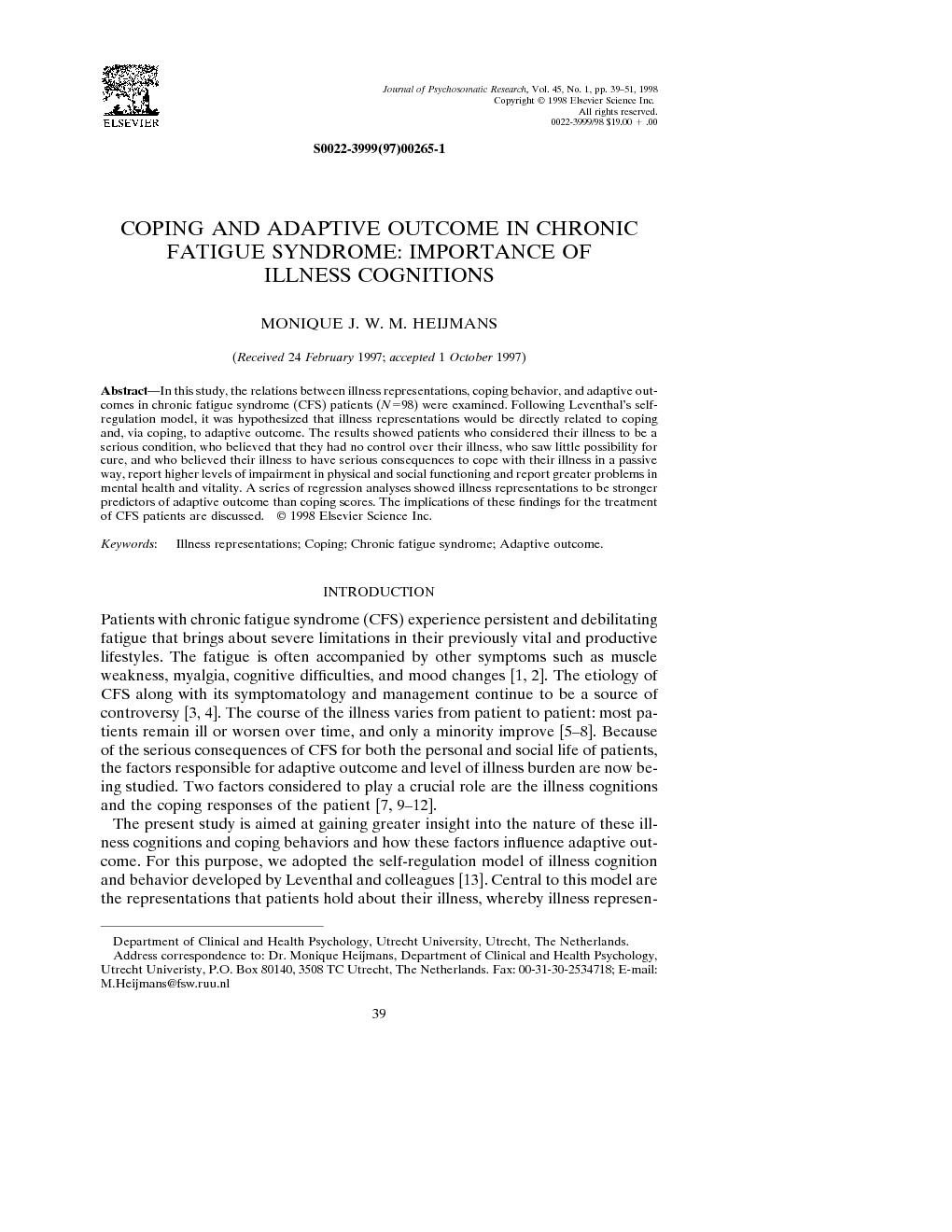In this study, the relations between illness representations, coping behavior, and adaptive outcomes in chronic fatigue syndrome (CFS) patients (N=98) were examined. Following Leventhal’s self-regulation model, it was hypothesized that illness representations would be directly related to coping and, via coping, to adaptive outcome. The results showed patients who considered their illness to be a serious condition, who believed that they had no control over their illness, who saw little possibility for cure, and who believed their illness to have serious consequences to cope with their illness in a passive way, report higher levels of impairment in physical and social functioning and report greater problems in mental health and vitality. A series of regression analyses showed illness representations to be stronger predictors of adaptive outcome than coping scores. The implications of these findings for the treatment of CFS patients are discussed.
Patients with chronic fatigue syndrome (CFS) experience persistent and debilitating fatigue that brings about severe limitations in their previously vital and productive lifestyles. The fatigue is often accompanied by other symptoms such as muscle weakness, myalgia, cognitive difficulties, and mood changes 1 and 2. The etiology of CFS along with its symptomatology and management continue to be a source of controversy 3 and 4. The course of the illness varies from patient to patient: most patients remain ill or worsen over time, and only a minority improve 5, 6, 7 and 8. Because of the serious consequences of CFS for both the personal and social life of patients, the factors responsible for adaptive outcome and level of illness burden are now being studied. Two factors considered to play a crucial role are the illness cognitions and the coping responses of the patient 7, 9, 10, 11 and 12.
The present study is aimed at gaining greater insight into the nature of these illness cognitions and coping behaviors and how these factors influence adaptive outcome. For this purpose, we adopted the self-regulation model of illness cognition and behavior developed by Leventhal and colleagues [13]. Central to this model are the representations that patients hold about their illness, whereby illness representations are defined as “patients’ own implicit, common-sense beliefs about their illness” [13, p. 10]. The self-regulation model predicts that illness representations are directly related to coping and, via coping, to adaptive outcomes such as disability and quality of life. Research into a number of illnesses has shown illness representations to be generally organized along five major dimensions 13 and 14: identity or the label assigned to the illness and knowledge of the symptoms associated with it; time-line or the course that the illness takes; cause or beliefs about the factors that are responsible for illness onset; beliefs about the possibilities for cure; and beliefs about the consequences of the illness for a person’s life.
Clinical studies have mainly provided information about the beliefs that CFS patients hold with regard to the identity and cause of their illness. The coping strategies of CFS patients have also received attention, and CFS patients can be characterized by an increased focus on bodily symptoms, a tendency to attribute their illness to a physical cause, and avoidance of physical activity as a coping strategy 9, 15 and 16. The latter may actually be maladaptive and in fact cause greater burden as the illness becomes chronic 6, 7, 8, 16, 17, 18 and 19.
In light of these findings, it seems useful to further explore the illness cognitions of CFS patients. A major question is whether physical attribution and avoidance of physical activity are, indeed, most important for adaptive outcome or if other cognitions also play an important role. In an empirical study of the cognitive and behavioral factors involved in CFS, for example, Moss-Morris et al. [20] found CFS patients to have a particularly negative view of not only the cause of their illness but also its symptoms, expected course, consequences, and possibilities for cure.
Another point in need of greater attention is the relation between illness representations and coping. Self-regulation theory predicts that illness representations will be directly related to coping and, via coping, to adaptive outcome. Coping is assumed to mediate in self-regulation theory between illness representations and adaptive outcome 21 and 22. The results of the study of Moss-Morris et al. [20], however, suggest that illness representations may also directly affect adjustment.
The main aim of the present study was to examine the implications of patients’ illness representations for adaptive outcome in greater detail. Three specific research questions were formulated for this purpose: (1) In what ways do the illness representations of CFS patients resemble each other? Given the level of uncertainty with regard to the cause, course and treatment possibilities for CFS, we wondered whether this uncertainty would also be reflected in the illness representations of patients with CFS. (2) Are the beliefs held by CFS patients with regard to the identity, course, treatment possibilities, cause, and consequences of their illness clearly related to their coping strategies, adaptive outcome, or both? (3) What is the relative impact of the patients’ illness representations on adaptive outcome when compared to the impact of the coping strategies they use?


